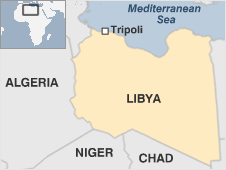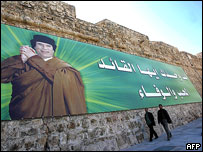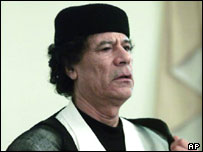Generic Medicines
Taj Pharma is the largest generic pharmaceutical company in India. We hold top positions in different established markets worldwide generics markets..
Libya, once shunned by much of the international community over the 1988 bombing of a PanAm plane above the Scottish town of Lockerbie, has undergone a dramatic rehabilitation.
 |
Months later, Libya renounced weapons of mass destruction, paving the way for a further blossoming of relations with the West.
A former Roman colony, Libya is a mostly desert country which saw invasions by Vandals, Byzantines, Arabs, Turks and more recently Italians before gaining independence in 1951.
AT-A-GLANCE
 Politics: Colonel Gaddafi took power in a 1969 coup; he presides over a system of "people's congresses"
Economy: Libya has large reserves of oil and gas; proposed reform of state-run economy has met with political opposition
International: Libya returned to the diplomatic fold after renouncing weapons of mass destruction and paying compensation for the Lockerbie bombing
|
Oil was discovered in 1959. With it, the country was transformed into a wealthy monarchy. Ten years later, though, the king was overthrown in a coup led by the 27-year-old Muammar Gaddafi, and Libya embarked on a radically new chapter in its history.
Colonel Gaddafi's revolution has been based largely on distinguishing his country from the world around it. Ideas put forward in his Green Book aim at an alternative to both communism and capitalism, while Islam is adhered to but with a unique slant - Libya has its own calendar based on Muhammad's death, for example.
Colonel Gaddafi called the new system a jamahiriya, loosely translated as a "state of the masses". Power is held by various people's committees, while in practice Gaddafi rules unopposed.
Libya was blamed for the Lockerbie plane bombing, and two Libyans suspected of organising the incident were handed over in 1999 for trial in The Hague under Scottish law. In 2001 one of the suspects was found guilty of killing 270 people in the bombing. Libya has since requested his transfer to Libya, as Britain and Libya signed a prisoner-exchange agreement in 2009.
Tripoli paid compensation to the US victims of the bombing in 2008, opening up the possibility of full diplomatic relations with the United States.
Libya possesses considerable reserves of oil and gas, but the sector remains relatively undeveloped.
Leader: Colonel Muammar Gaddafi
Once regarded as a pariah by the West, Colonel Gaddafi began his return to the international fold after Libya settled the Lockerbie bombing claims and agreed to stop developing weapons of mass destruction.

Libyan leader Muammar Gaddafi seized power in 1969
|
Western politicians, including the British, Italian, French and German leaders, have since visited Tripoli.
Muammar Gaddafi is the Arab world's longest-serving leader. A shrewd operator, he survived several attempts on his life and reinvented Libya's system of government.
The colonel came to power in a bloodless coup in 1969 against the ailing King Idris I. He was inspired by the Egyptian leader Gamal Abdul Nasser, who dominated Arab politics in the 1950s and 1960s.
A staunch Arab nationalist, Col Gaddafi's attempts to forge unity with other Arab states met with little success. In the 1990s he turned to Africa and proposed a "United States of Africa". The concept later found form as the African Union.
In the late 1970s Col Gaddafi introduced the jamahiriya - a system of governance based around "people's committees" and free of partisan politics. By the late 1980s he had given up his official titles to become leader of the revolution, while retaining absolute power.
Over the years Col Gaddafi has supported a broad range of militant groups, including the Irish Republican Army and the Palestine Liberation Organisation. Libya's alleged involvement in attacks in Europe in the 1980s triggered US military strikes in 1986. Dozens of people were killed, including the Libyan leader's adopted daughter.
One of Col Gaddafi's sons, Sayf al-Islam Gaddafi, is said to be behind the drive to break Libya's isolation. He has denied reports that he is being groomed to succeed his father.
Muammar Gaddafi was born in the desert near Sirte in 1942. He married twice and has eight children.
Media rights body Reporters Without Borders has said press freedom is "virtually non-existent" in Libya, with self-censorship being commonplace.
The state owns and strictly controls media outlets and the authorities do not permit the publication of opinions contrary to government policy.
Some international publications are available, but the authorities routinely censor them and may halt their distribution. Few press visas are issued to foreign journalists.
However, pan-Arab satellite TV stations are freely available and internet access is said to be unfettered, though closely monitored.
The Libyan Jamahiriyah Broadcasting Corporation is the state broadcaster. A non-state satellite TV, Al-Libiyah, launched in 2007. The authorities took control of the operation in April 2009.
The press
Television
Radio
News agency
Jana (Jamahiriyah News Agency) - state-run
AFRICA | ASIA-PACIFIC | AMERICAS | EUROPE | MIDDLEEAST | SOUTHASIA
![]()
![]()
![]()
Mauritania Mauritius Morocco Mozambique Namibia Niger Nigeria Republic-of-congo Rwanda Sao-tome-and-principe Senegal Seychelles Sierra-leone Somalia South-africa Sudan Swaziland Tanzania The-gambia Togo Tunisia Uganda Australia Brunei Burma Cambodia China East-timor Fiji Indonesia Japan Kazakhstan Kiribati Kyrgyzstan Laos Malaysia Marshall-islands Micronesia Mongolia Nauru New-zealand North-korea Palau Papua-new-guinea Samoa Singapore Solomon-islands South-korea Taiwan Tajikistan Thailand The-philippines Tonga Turkmenistan Tuvalu Uzbekistan Vanuatu Vietnam Antigua-and-barbuda Belize Bolivia Brazil Canada Chile Colombia Costa-rica Cuba Dominica Dominican-republic Ecuador El-salvador Grenada Guatemala Guyana Haiti Honduras Jamaica Mexico Nicaragua St-kitts-and-nevis St-lucia Suriname Trinidad-and-tobago Uruguay Venezuela Albania Andorra Armenia Austria Azerbaijan Belarus Belgium Bosnia-hercegovina Bulgaria Croatia Cyprus Czech-republic Denmark Estonia Finland France Georgia Germany Greece Hungary Iceland Ireland Italy Latvia Liechtenstein Lithuania Luxembourg Macedonia Malta Moldova Monaco Montenegro Norway Poland Portugal Russia San-marino Serbia Slovakia Slovenia Spain Sweden Algeria Egypt Iran Iraq Israel-and-palestinian-territories Jordan Kuwait Lebanon Libya Mauritania Oman Saudi-arabia Sudan Syria Tunisia United-arab-emirates Yemen Afghanistan Bangladesh Bhutan India Nepal Pakistan Sri-Lanka The-Maldive